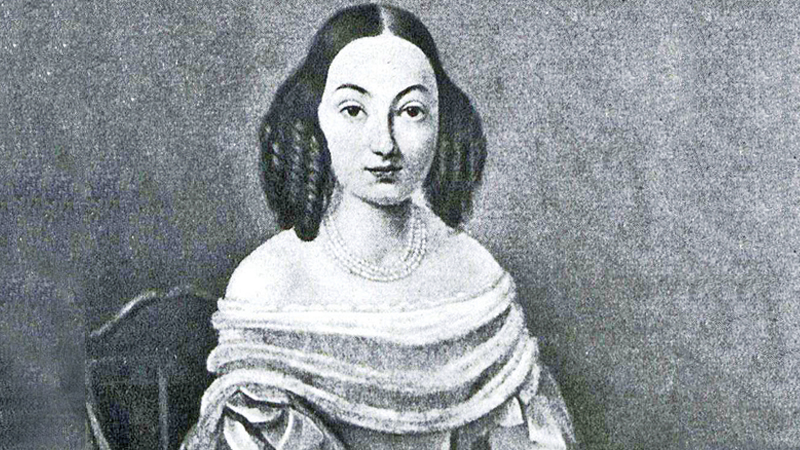In the nineteenth century, when its literature equaled that written in any place at any time in history, Russia had no “great” woman writer-no Sappho, no Ono, no Komachi or Murasaki Shikibu, no Madame de Staël or George Sand, no Jane Austen or George Eliot-or so we might say when surveying the best-known works of the age. But we now know this truth to be less than true.
Karolina Pavlova, born Karolina Karlovna Jaenisch in Yaroslavl in 1807, died in Dresden in 1893 after having lived outside Russia for four decades. She had abandoned her native country not because of czarist oppression but because of hostile criticism of her poetry and her personal life. She died without friends, without family, without money, without renown (not a single Russian newspaper gave her an obituary) but with an unyielding dedication to what she called her “holy craft,” which had produced a body of fine literary, largely poetic, works.
In 1848, when she had completed her only novel, A Double Life, Pavlova was not only devoted to art but also enjoyed other, more transient pleasures like love, friendship, and respect, which she was to lose later on. To judge from the irony that pervades her otherwise romantic description in this book about a young girl who has everything, Karolina Pavlova had come to expect little from the world beyond what her own talents and personality could bring to it. The theme of conflict between poet and society had informed the works of the great lyric poets who were her predecessors, Alexander Pushkin and Mikhail Lermontov.
Pavlova returned to this theme again and again, translating her emotions into verse of abstract classical precision, which her detractors called cold, heartless, and remote from the so-called real problems of life. Even when there was admiration for her poetry, it was mixed with ridicule of her personally. Thus, a letter of her fellow poet N. M. Iazykov in 1832 contains hints that this extraordinary phenomenon-a woman poet-was somehow ridiculous when reciting her poetry, as was then the custom. In this way was engendered a more subtle conflict than that of poet versus society: that of woman poet versus society and ultimately, of woman versus poet within Pavlova herself. As much as any woman of her time could in Russia, Pavlova lived in a man’s world. Her father, Karl Jaenisch, was a professor of physics and chemistry at the School of Medicine and Surgery in Moscow.
Her first romantic love was the great Polish poet Adam Mickiewicz, who tutored her in Polish (she already knew French, German, Spanish, Italian, Swedish, and Dutch, as well as Russian) and was stunned by her literary talent. In the late 1820s, Karolina Jaenisch was already attending the important literary gatherings in Moscow, translating poetry, and writing her own works in German and French. In 1833, her first book appeared-a translation of Russian poets into German called Das Nordlicht.
In December 1836, she married Nikolai Pavlov, a minor figure in the world of letters whose talent soon ran dry. Pavlov’s friend B. N. Chicherin wrote in his memoirs that Pavlov confessed to having married Karolina for her money-“a social misdemeanor,” Chicherin says, “that is quite usual and looked upon with indulgence.”
On Thursdays in their Moscow house from 1839 to 1844, the leading figures of the day attended the Pavlovs’ literary salon. Poets would read aloud from their latest works, and the exponents of the two social philosophies of the age, the Slavophiles and the Westernizers, would gather for sharp debate until their mutual hostility grew too great for social gatherings to countenance. The Pavlovs had a son named Ippolit, who recalled how his mother would often retire from her large and noisy household and compose her verses by speaking them aloud, walking back and forth in her room, repeating, rearranging, and modifying words and phrases.
An alien figure both because she was perceived as being “German” and because she was a woman poet, Pavlova lived above all for her art. The recurrent theme in her relationships with all her famous contemporaries is her need, through their friendship, to confirm her view of herself as a poet. In poetry dedicated to them, she constantly reiterates what she wrote to Yevgeny Baratynsky in 1842: “You have called me poet, / Liking my careless verse; / And I, warmed by your light, / Believed, then, in myself.”
But circumstances of her life conspired to undermine this belief. If Pavlov married Karolina for her money, he soon began to gamble it away, sometimes at the rate of 10,000 to 15,000 rubles in an evening. Friends noticed that as her literary fame increased and his declined, he grew jealous: “Soon her poetry will be read more than his short stories.
It seems he fears this.” Pavlov set up a separate household with a younger cousin of his wife, whom Karolina had taken in and helped support.
- The Paris Review



Add new comment